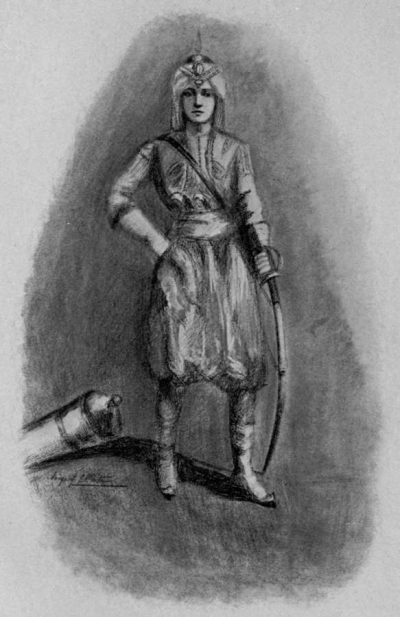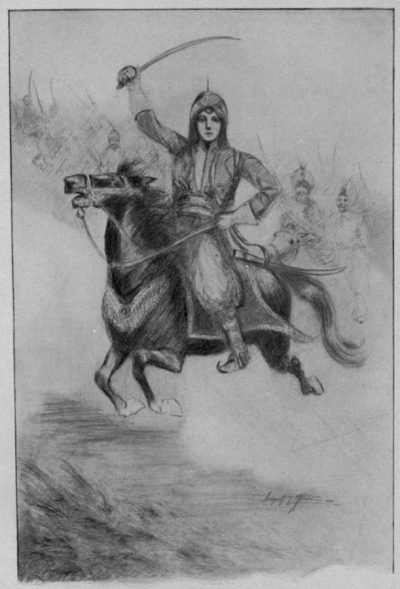Literary rating: ★★★½
Kick-butt quotient: ☆☆☆
“Fear not,” she retorted with animation, “that I will suffer the indignity of capture at their hands. My dead body they may find, but the spirit of the Rani of Jhansi will have carried more than one of them to an accounting before the great tribunal of justice.”

“With the exception of a white turban, she was attired in a blood-red uniform from head to foot.”
I’m surprised how sympathetic a portrayal this novel has of Queen Lachmi Bai (as it’s spelled here), considering when it was published. For this came out in 1901, a point at which India was still firmly under British rule – heck, Queen Victoria was on the throne as the year began. Yet Lachmi Bai is very much the heroine, portrayed respectfully, to an almost idealized degree. For instance, it begins with the rebel massacre of British troops and their families at Jhansi. Yet this is depicted as being in explicit defiance of her command to secure them as prisoners.
It’s a mix of historical fact and pure speculation, the latter being particularly evident in a fairly platonic love triangle between the Queen, and two of her (entirely fictitious, I suspect) lieutenants, the Hindu Prasad Singh and the Muslim Ahmad Khan. The latter is the villain of the piece. His blood-lust is responsible for the massacre, and he is depicted in phrases such as “the expression of his mouth and chin denoted cruelty and treachery—the latter, perhaps, an accomplishment rather than a failing to the Oriental mind.” [While there is an argument to be made here for Islamophobia in his depiction, given the highly positive way Lachmi Bai and Prasad are portrayed, accusations of general “racism” seem lazy]
However, even he spends much of the middle portion working faithfully in support of the queen’s mission to free her country from the British. Speaking of whom, there is one scene early in the book told from the point of view of the Empire. But thereafter, they are largely referred to as “the Foreigners,” again demonstrating the Indo-centric viewpoint of the novel. While they ultimately prevail, this is not reported with any sense of triumph. Indeed, White is remarkably prophetic, Lachmi Bai saying, almost with her final breath: “Not forever shall their horsemen ride triumphantly through the land. A day will come when their law shall be no longer obeyed, and our temples and palaces rise anew from their ruins.” 46 years later, India did indeed become an independent country.
“But even if defeat is again the will of God, if die we must; is it not better to perish as warriors should, in a feat of arms upon which the eyes of our enemies will gaze with marvel, than as wild beasts hunted through the jungle?”

“Her horse leaped forward, straight for Sindhia’s guns.”
The story told here bypasses her entire life and marriage, joining proceedings after she has already become a widow. In the early stages, Lachmi Bai also takes a back seat, with the storyline revolving around Ahmad and Prasad’s rivalry. The former manipulates the latter into believing the Queen is having an affair with young officer Dost Ali, and also the Queen into believing Prasad is plotting against her. This leads to his exile for the middle of the book, until returning after the fall of Jhansi, as the Queen is making her escape from the city. Though I must say, Ahmad’s eventual fate is rather underwhelming, in a “Cersei Lannister” kind of way. Without getting too spoilery, hopes he would meet the point of Lachmi Bai’s sword proved unfulfilled.
The latter half focuses more on the Queen, as fate deals her cards both good and bad. It’s made clear the military reverses suffered are not her fault, or in any way reflect her bravery. Her commanders are to blame, along with a tendency for her forces to break under pressure. Yet, as the quote above says, she would rather have a glorious death than a subservient life. The comparisons to Jeanne D’Arc are understandable, and made explicit: “A second Jeanne D’Arc, as valiant in battle, more subtle in council than the Maid of Orleans, moved by the same passionate love for her country, had cast in their teeth a wager of defiance, to stand until either they were driven from her state, or she had perished.”
Of course, we know how the story ends, and White gives Lachmi Bai the heroic send-off she deserves: “She drew the folds of a shawl over her face to hide her death agony, and again lay down. The blackness of night grew deeper, the silence more intense. Presently, strange, warrior forms seemed to appear from the unknown and filled the Rani’s tent. One supremely beautiful figure, in dazzling raiment, came forth to enfold the dying woman in her arms.” It’s surprisingly touching, and a decent end to a story which has survived the passage of almost 120 years better than I expected
Author: Michael White
Publisher: J. F. Taylor & Company, available as an e-book for free from Project Gutenberg.




